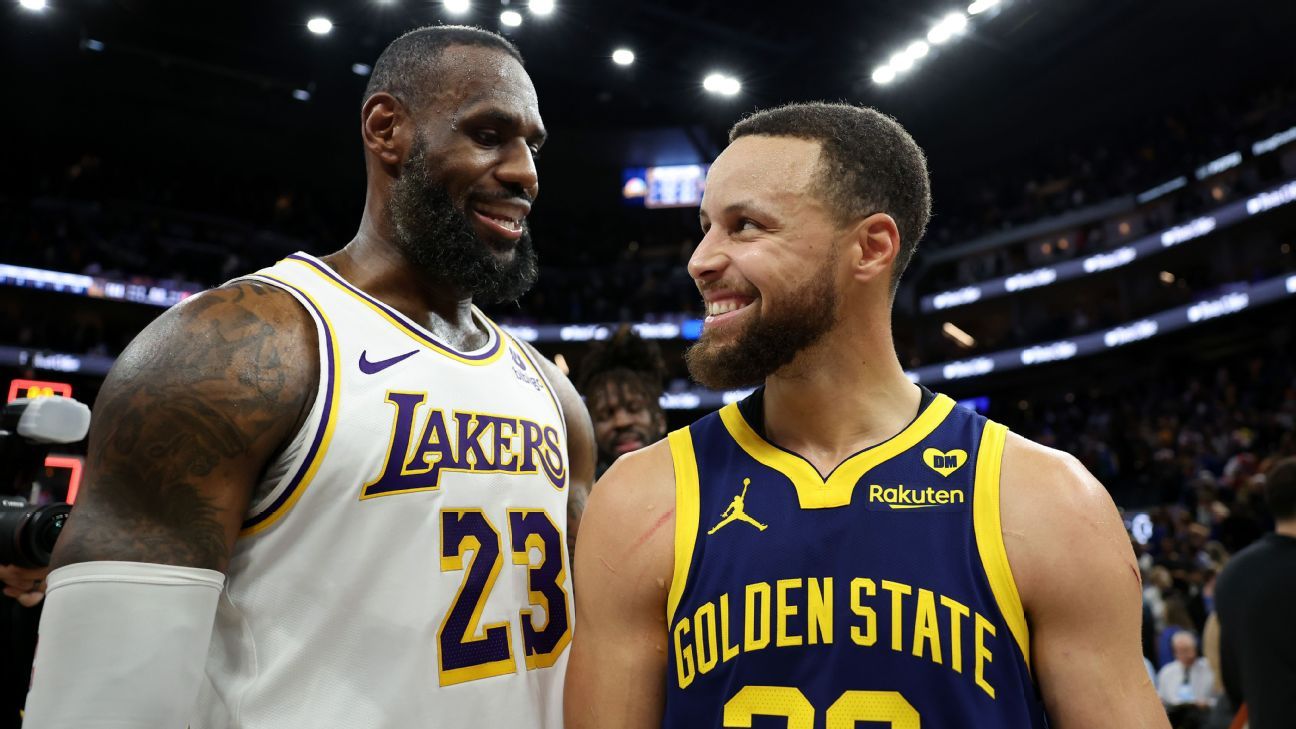Sunday afternoon after a valuable victory for the Los Angeles Lakers in New Orleans, LeBron James asked aloud how many games he ended up playing in his just-concluded 21st NBA regular season.
The answer was officially 71, but really 72 if counting the in-season tournament championship game which awkwardly isn’t counted. That’s 16 (17 unofficially) more games than last season and the most in his six-year tenure with the Lakers.
James shook his head in satisfaction.
“That’s pretty cool,” James said. “At this point in my career to play 70-plus games and be available for my guys.”
This is reality. To be 39 years old, the oldest active player in the league, and dealing with some chronic injuries to his ankle, his foot and long-term maintenance of other areas such as his lower back, to play that many games is indeed cool.
The Lakers finished the regular season 47-35, four games better than last season, and James thought that was pretty good, too.
“To end the season 12 games over .500, 13 if you count the championship of in-season tournament, for everything we went through,” James said, “it’s a pretty good season for us.”
This is reality, too. The Lakers finished the season winning 13 of their last 18 games and slipped into eighth in the West at the finish line after spending months stuck in ninth or lower.
But for James, reality is easily skewed. He doesn’t live in a world where “good” seasons are accepted at face value.
He shares this status with Steph Curry, who will also compete in Tuesday’s play-in tournament. The Golden State Warriors will play the Sacramento Kings just after James takes on the New Orleans Pelicans as the West teams fight to gain entry to the playoffs.
James and Curry are superstars of a certain age. Their dominance in their primes and extended run of winning at the highest level has made anything less than that seem like failure.
Between 2011 and 2022, either James or Curry played in the Finals for 11 out of 12 years. They played against each other four times. Last season, they played in a series that smashed television ratings records as the Lakers won and James reached his 12th career conference finals.
When this is your résumé, you aren’t afforded the luxury of simply maximizing your current team’s chances. James and Curry are judged aggressively both against ghost adversaries who have long retired and against themselves when they were younger, healthier and played in a less competitive league.
“This last 30 games has just been ‘Operation: Give ourselves a chance,'” Curry said last week.
“You could look at it a lot of different ways. You could look at our record [down the stretch] and extrapolate that out for 82 games and you’re probably not in this situation. But all the things we’ve gone through and the way the West is stacked, that’s our situation. Doesn’t really matter.”
The Warriors were 19-24 in late January with Draymond Green suspended, Chris Paul injured and Klay Thompson amid a long slump. Stories leaked about role players undermining coach Steve Kerr, and Curry himself was quoting the definition of insanity.
The Warriors then went 27-12 to finish the season. But if they lose one of their next two games, they will surely sit through a torrent of “end of the road” storylines.
In 2016, when they blasted the league en route to 73 wins, the Warriors’ current 46-36 record would’ve had them in the No. 5 seed. The conference’s depth now is totally different, and the margin for error is the tightest it’s been in the past two decades.
“This whole season has been weird,” Curry said.
The Lakers just completed their second-best regular season in the past 13 years, behind only the 52-win season in 2019-20 that ended in a title. This season, if they have a bad week, James and the Lakers will deal with heavy fallout simply because of the expectations that have been established for the franchise.
Like the Warriors, the Lakers will be awarded no bonus points based on a perspective that looks at the entire lay of the land.
“I took a lot of pride in the offseason in getting my foot, my ankle back in order, getting my body back in order,” James said. “And it’s definitely paid off for me.”
In addition to getting healthier, James adjusted his shooting form and finished the season at 41% from 3-point range, the best of his career. This will end up being a footnote to a footnote.
Curry played in 74 games, his most in seven seasons. He had his 10th season of shooting at least 45% overall, 40% from 3 and 90% from the line. But there is next to no interest in this statistic — Curry normalized great shooting years ago.
Instead, he and James will eventually trudge off to the summer, likely listening to plenty of talk about how they’ve won their last NBA championships … when they join up in Paris for Team USA in an attempt to win an Olympic gold medal.
This is James and Curry’s existence. They are used to heavy expectations and doomsday predictions, and the presumption will be no different this week.
“You can’t avoid those conversations; they’ve been hovering over us [for years],” Curry said Monday. “When you’re out on the floor as a player performing at that level and understanding what’s expected of yourself and your team, that environment brings the best out of you.”
